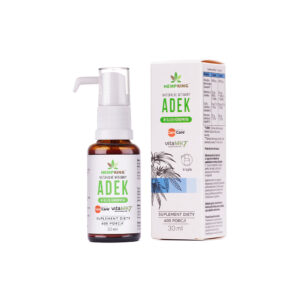
The Essential Role of Fat-Soluble Vitamins: A, D, E, and K in Holistic Health
Introduction
In the intricate world of nutrition, vitamins play a crucial role in maintaining our overall health and well-being. Among these essential nutrients, fat-soluble vitamins A, D, E, and K stand out due to their unique properties and vital functions in the body. Unlike their water-soluble counterparts, these vitamins are absorbed along with fats in our diet and can be stored in the body’s fatty tissues and liver for future use. This characteristic allows our bodies to maintain reserves of these crucial nutrients, ensuring their availability when needed.
In this comprehensive guide, we’ll delve deep into the world of fat-soluble vitamins, exploring their individual roles, benefits, and synergistic effects. We’ll also discuss how you can ensure you’re getting enough of these vital nutrients in your diet and introduce a high-quality supplement that can help you meet your nutritional needs.
Understanding Fat-Soluble Vitamins
Before we dive into the specific roles of each vitamin, it’s important to understand what makes fat-soluble vitamins unique:
- Absorption: Fat-soluble vitamins are absorbed along with dietary fats in the small intestine. This means that consuming these vitamins with a source of fat can enhance their absorption.
- Storage: Unlike water-soluble vitamins that are excreted if not used, fat-soluble vitamins can be stored in the liver and fatty tissues for extended periods.
- Dosage: Due to their storage capability, it’s possible to accumulate excessive amounts of fat-soluble vitamins in the body. While this is rare with a balanced diet, it’s important to be mindful of supplementation.
- Fat dependency: The absorption and utilization of these vitamins are closely tied to fat metabolism in the body.
Now, let’s explore each of these essential vitamins in detail.
Vitamin A: The Visionary Nutrient
Vitamin A is a group of fat-soluble compounds that play a critical role in numerous bodily functions. It’s often referred to as the “visionary nutrient” due to its crucial role in maintaining healthy vision.
Key Functions of Vitamin A:
- Vision: Vitamin A is a key component of rhodopsin, a protein in the retina that absorbs light. This makes it essential for maintaining good vision, especially in low-light conditions.
- Immune Function: It supports the production and function of white blood cells, which are crucial for capturing and clearing bacteria and other pathogens from your system.
- Skin Health: Vitamin A promotes healthy skin by supporting cell production and turnover. It’s often used in skincare products for its ability to combat signs of aging and improve skin texture.
- Cellular Communication: It plays a vital role in cell-to-cell communication, which is crucial for proper development and function of organs.
- Reproduction: Vitamin A is essential for reproductive health and fetal development.
Sources of Vitamin A:
- Animal sources (preformed vitamin A): Liver, fish oils, milk, eggs
- Plant sources (provitamin A carotenoids): Sweet potatoes, carrots, spinach, kale, apricots
Vitamin D: The Sunshine Vitamin
Vitamin D is unique among vitamins because our bodies can produce it when our skin is exposed to sunlight. This has earned it the nickname “the sunshine vitamin.” Despite its availability through sunlight, many people still struggle to maintain adequate levels of vitamin D, making it one of the most common nutrient deficiencies worldwide.
Key Functions of Vitamin D:
- Bone Health: Vitamin D is crucial for calcium absorption in the gut and helps maintain adequate serum calcium and phosphate concentrations. This makes it essential for building and maintaining strong bones and teeth.
- Immune Support: It modulates the immune response, potentially reducing the risk of infections and autoimmune diseases.
- Mood Regulation: Adequate levels of vitamin D have been associated with a lower risk of depression and improved mood.
- Muscle Function: Vitamin D plays a role in muscle strength and reducing the risk of falls, especially in older adults.
- Cardiovascular Health: Some studies suggest that vitamin D may help lower blood pressure and reduce the risk of heart disease.
Sources of Vitamin D:
- Sunlight exposure (the body produces vitamin D when skin is exposed to UVB rays)
- Fatty fish (salmon, mackerel, tuna)
- Egg yolks
- Fortified foods (milk, orange juice, cereals)
- Mushrooms exposed to UV light
Vitamin E: The Antioxidant Defender
Vitamin E is renowned for its powerful antioxidant properties. It acts as a defender against oxidative stress, protecting our cells from damage caused by free radicals. This protection is crucial for maintaining overall health and potentially preventing chronic diseases.
Key Functions of Vitamin E:
- Antioxidant Protection: Vitamin E neutralizes free radicals, preventing cellular damage that can lead to chronic diseases and signs of aging.
- Skin Health: It helps maintain skin integrity and moisture, promoting a healthy, youthful appearance.
- Immune Function: Vitamin E enhances the body’s immune response, helping to fight off infections.
- Eye Health: Some studies suggest that vitamin E may help prevent age-related eye diseases.
- Cognitive Function: There’s evidence that vitamin E might help slow cognitive decline in older adults.
Sources of Vitamin E:
- Nuts and seeds (almonds, sunflower seeds, hazelnuts)
- Vegetable oils (sunflower, safflower, wheat germ oil)
- Green leafy vegetables (spinach, collard greens)
- Avocados
- Fortified cereals
Vitamin K: The Blood and Bone Health Guardian
Vitamin K is often overlooked but plays a crucial role in blood clotting and bone metabolism. There are two main forms of vitamin K: K1 (phylloquinone) found in plant foods, and K2 (menaquinone) produced by bacteria in the gut and found in some animal products and fermented foods.
Key Functions of Vitamin K:
- Blood Clotting: Vitamin K is necessary for the synthesis of several proteins involved in blood coagulation. This makes it essential for proper wound healing.
- Bone Health: It supports bone mineralization and may help reduce the risk of fractures. Vitamin K works synergistically with vitamin D to regulate calcium metabolism.
- Heart Health: Emerging research suggests that vitamin K may help prevent arterial calcification, potentially reducing the risk of heart disease.
- Cognitive Function: Some studies indicate a potential role for vitamin K in maintaining cognitive function as we age.
Sources of Vitamin K:
- Green leafy vegetables (kale, spinach, collard greens, broccoli)
- Vegetable oils (soybean, canola, olive oil)
- Some fruits (blueberries, figs, prunes)
- Fermented foods (natto, cheese) – especially rich in vitamin K2
The Synergistic Power of ADEK Vitamins
While each of these vitamins has unique and crucial functions, they often work synergistically to support overall health. For instance:
- Vitamins D and K work together to enhance bone health by regulating calcium metabolism. While vitamin D promotes calcium absorption, vitamin K ensures that calcium is deposited in the bones rather than in soft tissues.
- The antioxidant properties of vitamins A and E complement each other in protecting cells from oxidative damage. This synergy may enhance their overall protective effects on various tissues and organs.
- Vitamin D and vitamin A both play important roles in immune function, potentially providing a more robust defence against pathogens when adequate levels of both are present.
- The combination of vitamins E and K may have beneficial effects on heart health, with vitamin E’s antioxidant properties complementing vitamin K’s role in preventing arterial calcification.
Understanding these synergistic relationships underscores the importance of maintaining a balance of all these essential nutrients in our diets.
Ensuring Adequate Intake of Fat-Soluble Vitamins
 While a balanced diet rich in fruits, vegetables, nuts, seeds, and healthy fats can provide many of these essential nutrients, modern lifestyles and dietary habits can sometimes make it challenging to meet all our nutritional needs through food alone. This is where high-quality supplements can play a valuable role.
While a balanced diet rich in fruits, vegetables, nuts, seeds, and healthy fats can provide many of these essential nutrients, modern lifestyles and dietary habits can sometimes make it challenging to meet all our nutritional needs through food alone. This is where high-quality supplements can play a valuable role.
Introducing ADEK Vitamin Drops in Bio Hemp Oil
To help you meet your nutritional needs conveniently and effectively, we’re proud to offer our ADEK Vitamin Drops in Bio Hemp Oil. This unique blend combines vitamins A, D3, E, and K2 in a base of organic hemp oil, ensuring optimal absorption and additional health benefits.
Key Features of Our ADEK Vitamin Drops:
- Comprehensive Nutrient Blend: Carefully measured doses of vitamins A, D3, E, and K2 support a wide range of bodily functions.
- Organic Hemp Oil Base: Enhances bioavailability and provides additional health benefits associated with hemp oil.
- High-Quality, Natural Ingredients: Includes patented, high-quality components like CaroCare®, EVnol™, and VitaMK7®.
- Purity and Convenience: Free from lactose, gluten, and artificial additives, making it suitable for various dietary preferences.
- Proven Results: Our product has already helped thousands of people achieve better health and well-being.
Conclusion
Fat-soluble vitamins A, D, E, and K play indispensable roles in maintaining our overall health. From supporting vision and immune function to promoting bone health and protecting against oxidative stress, these vitamins are truly essential for our well-being. By understanding their functions and ensuring adequate intake through a balanced diet and appropriate supplementation when needed, we can support our bodies in functioning optimally.
A, D, E, K Vitamin supplements in a base of high-quality hemp oil offer a convenient and effective way to supplement these crucial nutrients. With a carefully crafted blend of these essential vitamins, such supplements are designed to support your body’s needs naturally.
Remember, while supplementation can be beneficial, it’s always important to consult with a healthcare professional before starting any new supplement regimen, especially if you have pre-existing health conditions or are taking medications.
If you need more information about fat-soluble vitamins and their benefits, I’m happy to provide additional guidance. Feel free to contact me at titsian@rehealth.me with any questions. I also encourage you to share this information with others who might benefit from learning about these essential nutrients.
I appreciate your comments on my posts as they help build our community and spread awareness about natural health approaches. For those interested in other therapeutic options, please explore the various treatments available at Rehealth.me, including Hirudotherapy, manual therapy, ear coning, and cupping therapy (both dry and wet Hijama).
Sources:
- The Fat-Soluble Vitamins: A, D, E, and K – Healthline
- Fat-soluble vitamins: Types, function, and sources – Medical News Today
- What To Know About Fat-Soluble Vitamins – Cleveland Clinic Health …
- From A to K: Your Complete Vitamin Guide – Ask The Scientists
- Fat-Soluble Vitamins: A, D, E, and K – Extension
- A D E K: The vital vitamins – Complete Wellbeing
- Vitamins A, B, C, D, E, K: The building blocks of your body
- Fat-Soluble Vitamins: Why You Need Vitamins a, E, D, and K
